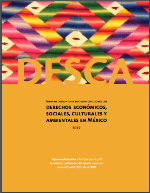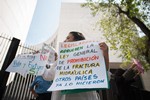Mexico
Published on Wed, 2019-01-23 16:08
Human rights are the departure point for the civil society critique of official policies in Mexico. Mexican civil society organizations demand coherence between the 2030 Agenda and governmental policies in economic and energy matters. They claim that the ongoing reform of the energy sector prioritizes business activities of exploration and exploitation of hydrocarbons over any other activity in the territories and without the necessary safeguards that effectively protect water, biocultural heritage, health of people and communities. |
Published on Mon, 2018-07-16 00:00
The experience of Voluntary National Reviews and of Civil Society shadow (or spotlight) reporting. The side event "SDG Implementation at National Level: What’s the Point of National Reports?" was held on July 17 in New York, during the meeting of the High Level Political Forum of the UN. The debate focused on voluntary national reports (VNRs) and parallel “shadow” or “spotlight” reports generated by civil society organizations (CSOs) on progress towards the Sustainable Development Goals (SDGs). |
|
In March 2018, after examining Mexico’s compliance with the International Covenant on Economic, Social and Cultural Rights (ICESCR), the UN Committee on Economic, Social and Cultural Rights approved among its final observations a recommendation on the priority of human rights and social participation when implementing the 2030 Agenda for Sustainable Development at the national level. The Committee also stressed that the 2030 Agenda and its Sustainable Development Goals are not an end in themselves, but tools for the ultimate goal of realizing human rights, and asked the Mexican State to integrate the final observations into the work of the National Council of the 2030 Agenda.
If the Mexican Government takes these recommendations seriously, it could trace an effective implementation route for the 2030 Agenda, but current policies are far from what is needed, as can be seen from the following analysis.
|
Published on Thu, 2018-03-08 17:58
In the more than 11 years since Mexico’s last periodic review by the UN Committee on Economic, Social, and Cultural Rights, international scrutiny of the human rights situation in Mexico has centered largely on civil and political rights. However, the human rights crisis in our country also includes a multiplicity of economic, social, cultural, and environmental (“ESC”) rights violations committed by state and non-state actors, through acts and omissions that remain in impunity. In this context, the undersigned civil society organizations and networks submit this Alternative Report to the Committee with the aim of contributing to its important and urgent work in the supervision of the situation of ESC rights in Mexico. The report reflects our collective experience of many years in the investigation, documentation and defense of these rights, and seeks to clarify the current situation in the country, as well as identify key obstacles, setbacks, limitations, and challenges for the full enjoyment of ESC rights. |
|
Source: . Published on Mon, 2017-12-11 10:06
Organizaciones no gubernamentales (ONG) de 30 países repudiaron hoy la deportación de un activista noruego y de una periodista británica-ecuatoriana que venían a participar o a cubrir la conferencia... |
Published on Fri, 2017-11-10 16:59
Water is a key concern in Mexico, where 100 civil society organizations submitted a joint report to the UN documenting how “privatization policies benefit extractive industries and mega-projects instead of reducing inequalities in access to essential services”. Users with difficulties in paying the increased tariffs are being denied their human right to water and the quality of the water distributed has deteriorated so much in many places that in Aguascalientes 95 percent of the water people drink is bottled. The report points out that water issues affect women disproportionately. “When there is a shortage, irregular delivery or bad quality water, women spend more time to bring water to their homes, boil it, filter it and deal with the authorities, frequently adding up to 30 hours a week to their domestic work.” The Mexico Social Watch report emphasizes that “insufficient and ineffective regulations on environmental and social impact, have led to numerous cases of violation of fundamental rights due to business activities”. |
|
In Mexico it is urgent to protect human rights from corporate abuses and end impunity rather than continue to promote private investment without effective environmental, social and human rights requirements. The national context favours the promotion of business but not sustainable development or human rights: legal reforms that give priority to energy projects over any other activity, lax and outdated environmental regulations, and a State that is indifferent to business abuses affecting civil, political, economic, social, cultural and environmental human rights of the population. In short, Mexico is a State that ignores its obligation to protect human rights from its violation by non-state actors.
|
|
Source: . Published on Tue, 2017-07-11 00:00
Las privatizaciones del sector público han servido para empeorar las condiciones de vida pues exacerban las desigualdades, y ponen en peligro el cumplimiento de los derechos humanos. México. Erradicar la pobreza extrema para el año 2030, una aspiración central de los Objetivos de Desarrollo Sostenible (ODS) de las Naciones Unidas, es posible, pero sería necesario cambiar los actuales enfoques de política pública impulsados en el mundo, de acuerdo a un estudio. Elaborado por una coalición de organismos civiles y sindicatos, el documento señaló que la erradicación es posible con los recursos económicos actuales en el mundo, pero las políticas públicas que podrían lograr ese propóstico han sido severamente debilitadas en las últimas décadas. |
Published on Fri, 2016-07-22 18:59
The Mexican legal framework on energy amended in 2013 and 2014 presents obstacles to the exercise of human rights as well as to achieving the SDGs, as it prioritizes the activities of exploration and exploitation of hydrocarbons "over any other involving the use of the surface and subsurface of the lands concerned". The framework establishes several legal provisions such as the determination of legal easements for hydrocarbons to public, private, national and transnational energy projects (some of which employ harmful techniques such as hydraulic fracturing or fracking), which constitutes a regression in terms of human rights and the environment, while seriously compromising the achievement of the SDGs. |
|
Source: . Published on Wed, 2016-07-13 11:30
CIUDAD DE MÉXICO (apro).- Al favorecer los megaproyectos por encima de los derechos civiles, políticos, sociales, culturales y ambientales de la población mexicana, la reforma energética pone en peligro el cumplimiento de siete de los 17 Objetivos para el Desarrollo Sostenible (ODS), según la organización Social Watch. Con estos objetivos, los países miembros de las Naciones Unidas aspiran a erradicar la pobreza, reducir las desigualdades, proteger la naturaleza y promover los derechos humanos en el mundo hacia el horizonte 2030. |
SUSCRIBE TO OUR NEWSLETTER










